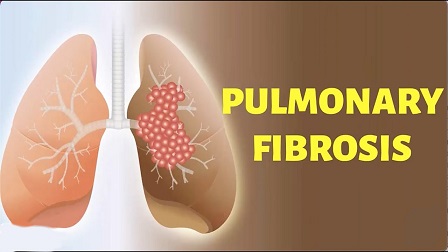UCLA Study Finds That COVID-19 Infections Drives Endothelial Cell-Like Myofibroblasts Towards Actual Myofibroblasts Causing Pulmonary Fibrosis!
COVID-19 News - Endothelial Cell-Like Myofibroblasts - Actual Myofibroblasts - Pulmonary Fibrosis Jul 17, 2023 1 year, 8 months, 4 weeks, 11 hours, 21 minutes ago
Study Reveals That Pulmonary Fibrosis In COVID-19 And Post COVID Individuals Is Driven In A Unique Manner!
COVID-19 News: The ongoing COVID-19 pandemic has had a profound global impact, with patients at an increased risk of developing pulmonary fibrosis. In a fascinating study conducted by researchers at the David Geffen School of Medicine at the University of California, Los Angeles, and Stanford University, they explored the underlying cellular mechanisms driving the development of pulmonary fibrosis in COVID-19 patients. By analyzing publicly available data and conducting experiments on mouse lungs, the study revealed that COVID-19 infection drives endothelial cell-like myofibroblasts towards actual myofibroblasts, leading to the development of pulmonary fibrosis. These findings shed light on the pathogenesis of COVID-19-related pulmonary fibrosis and offer potential avenues for therapeutic intervention.

COVID-19 has emerged as a global health crisis, causing millions of infections and numerous deaths worldwide. While many individuals experience mild or no symptoms, others suffer severe damage to their lungs without them even knowing! Recent studies and
COVID-19 News reports have reported a significant increase in COVID-19-related pulmonary fibrosis, a debilitating lung condition characterized by the excessive deposition of fibrotic tissue in the lungs. To understand the cellular mechanisms contributing to this condition, study team investigated the role of endothelial cell (EC)-like myofibroblasts, derived from pulmonary endothelial lineage cells, in the development of pulmonary fibrosis.
The study team utilized publicly available single-cell RNA sequencing (scRNA-seq) data from patients with severe pulmonary fibrosis after COVID-19 infection. They analyzed the composition of pulmonary endothelial lineage cells and identified alterations in the percentages of different cell types. By plotting the differentiation trajectory, the study revealed a clear transition from endothelial cells to EC-like myofibroblasts and eventually to myofibroblasts.
The study team also examined the expression of cytokines and matrix-associated proteins to further elucidate the role of COVID-19 infection in driving this differentiation process. To explore the generalizability of their findings, they conducted a similar analysis using scRNA-seq data from mouse lungs infected with influenza A virus.
The analysis of scRNA-seq data from COVID-19 patients demonstrated a robust increase in EC-like myofibroblasts and myofibroblasts in pulmonary fibrosis cases. The differentiation trajectory showed a clear direction from endothelial cells to EC-like myofibroblasts and myofibroblasts, indicating that COVID-19 infection drives this transition.
Moreover, the study team found specific patterns of cytokine expression and the induction of matrix-associated proteins, suggesting a dysregulated microenvironment promoting fibrosis. The analysis of influenza A viral infection in mice lungs revealed a similar differentiation trajectory, indicating that certain viral infections may share common mechanisms in the development of pulmonary fibrosi
s. The study also highlighted the role of matrix Gla protein (MGP) in regulating this differentiation process.
This new study provides valuable insights into the cellular mechanisms underlying COVID-19-related pulmonary fibrosis. By demonstrating the transition of endothelial cell-like myofibroblasts towards actual myofibroblasts, the study team highlights the importance of these cells in driving fibrotic processes.
The study findings suggest that excessive TGF-beta production and dysregulated BMP-1 activity may play a role in promoting this differentiation pathway.
Moreover, the study introduces the potential use of berbamine, a plant-derived compound, as a therapeutic intervention for COVID-19-related pulmonary fibrosis. Further research in this area holds promise for developing effective treatments to mitigate the long-term consequences of COVID-19 infection on lung health.
The study findings were published in the peer reviewed International Journal of Molecular Sciences.
https://www.mdpi.com/1422-0067/24/14/11500
For the latest
COVID-19 News, keep on logging to Thailand Medical News.
Read Also:
https://www.thailandmedical.news/news/breaking-silent-tsunami-of-post-covid-lung-fibrosis-occurring-among-many-indian-researchers-warn-that-even-asymptomatics-are-at-risk
https://www.thailandmedical.news/news/long-covid-news-stanford-study-shows-that-innate-immune-cell-activation-causes-lung-fibrosis-that-can-lead-to-long-covid-breathing-problems
https://www.thailandmedical.news/news/unraveling-the-enigma-of-post-covid-lung-fibrosis-maladaptive-signals-drive-fibroproliferation,-cedars-sinai-researchers-reveal
https://www.thailandmedical.news/news/breaking-study-finds-that-diabetes-can-also-contribute-to-the-development-of-lung-conditions-such-as-idiopathic-pulmonary-fibrosis-ipf
https://www.thailandmedical.news/news/covid-19-news-study-validates-that-sars-cov-2-accessory-proteins-orf6,-orf8,-orf9b-and-orf9c-involved-in-profibrotic-processes
https://www.thailandmedical.news/news/university-of-virginia-study-finds-that-sars-cov-2-infections-triggers-reduction-in-circulating-monocytes-that-leads-to-persistent-post-covid-pulmonar
https://www.thailandmedical.news/news/great-news-most-post-covid-individuals-will-develop-lung-issues-similar-to-idiopathic-pulmonary-fibrosis-ipf-with-potential-serious-outcomes
https://www.thailandmedical.news/news/university-of-north-carolina-murine-study-shows-that-sars-cov-2-infections-ultimately-lead-to-chronic-pulmonary-epithelial-and-immune-cell-dysfunction
https://www.thailandmedical.news/news/breakthrough-university-of-alabama-study-finds-that-the-drug-to-treat-blood-cancer-venetoclax-could-be-repurposed-to-reverse-lung-fibrosis
https://www.thailandmedical.news/news/mayo-clinic-researchers-discovers-way-to-reverse-fibrosis
